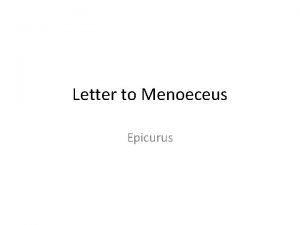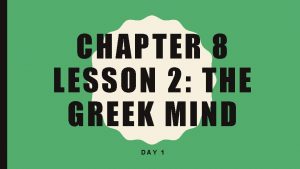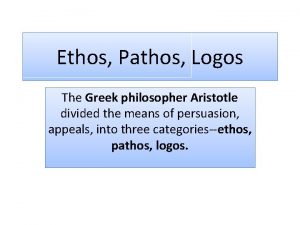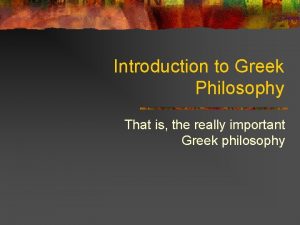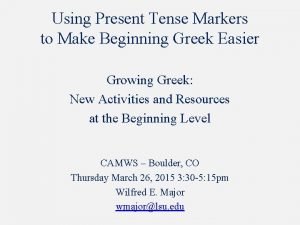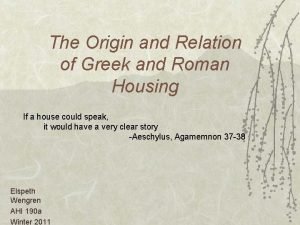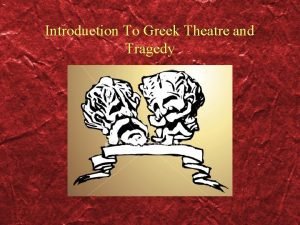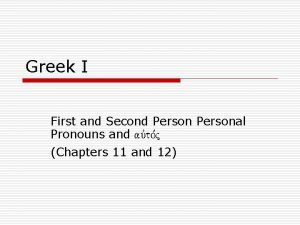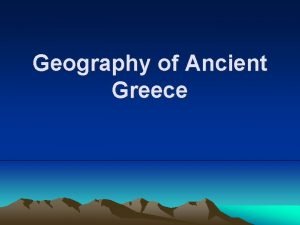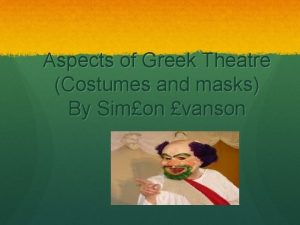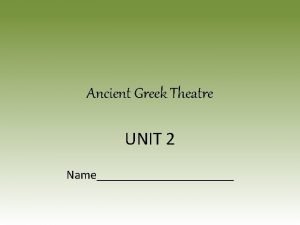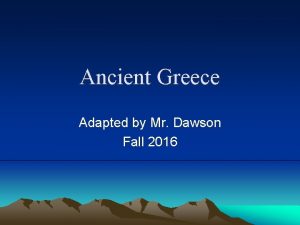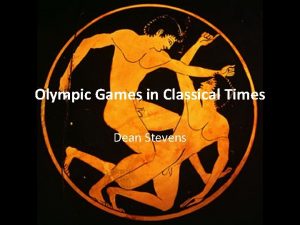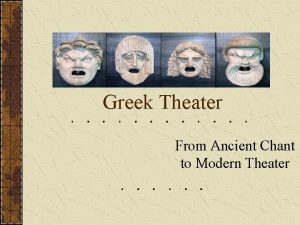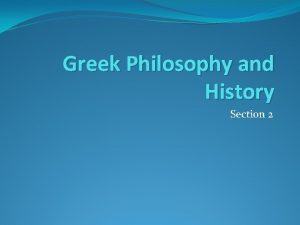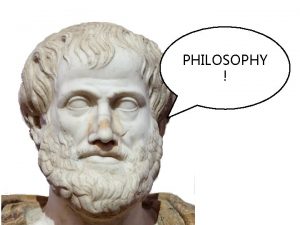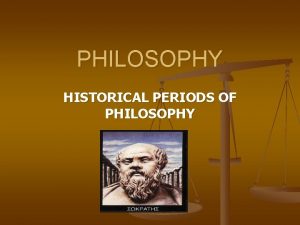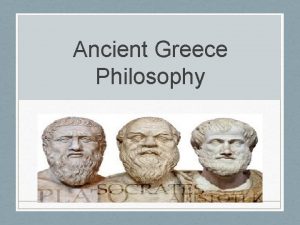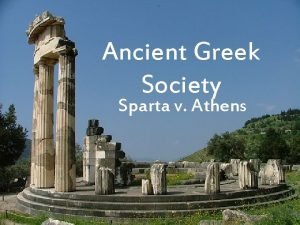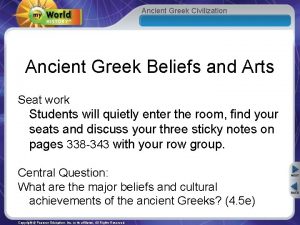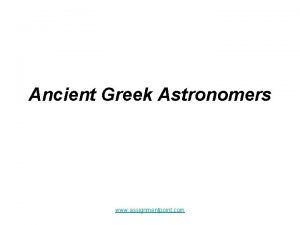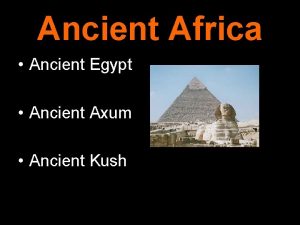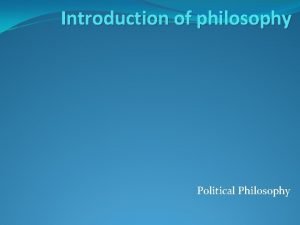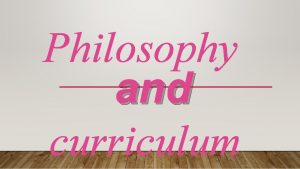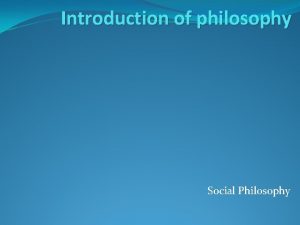ANCIENT GREEK PHILOSOPHY Free Will Epicurus vs the






























- Slides: 30

ANCIENT GREEK PHILOSOPHY 哲學研究所專任助理教授 陳斐婷


Free Will (Epicurus vs. the Stoics) (March) Possibility of Change (Heraclitus vs. Parmenides) (April to May) Virtue and Happiness (Aristotle vs. Epicurus) (May to June)




單元一 Free Will

第一幕(The Iliad, Book 1) The quarrel between Agamemnon and Achilles

Book 1, 1 -7 Μῆνιν ἄειδε θεὰ Πηληϊάδεω Ἀχιλῆος οὐλομένην, ἣ μυρί’ Ἀχαιοῖς ἄλγε’ ἔθηκε The wrath (μῆνιν) sing, goddess, of Peleus' son, Achilles, that destructive wrath which brought countless woes upon the Achaeans, and sent forth to Hades many valiant souls of heroes, and made themselves spoil for dogs and every bird; thus the plan of Zeus came to fulfillment, from the time when first they parted in strife Atreus' son, king of men, and brilliant Achilles.

Book 1, 8 -21 Who then of the gods was it that brought these two together to contend? The son of Leto and Zeus; for he in anger against the king roused throughout the host an evil pestilence, and the people began to perish, because upon the priest Chryses the son of Atreus had wrought dishonor (ἠτίμασεν). . . “Sons of Atreus, and other wellgreaved Achaeans, to you may the gods who have homes upon Olympus grant that you sack the city of Priam, and return safe to your homes (οἴκαδ’); but my dear child release to me, and accept the ransom out of reverence (ἁζόμενοι) for the son of Zeus, Apollo who strikes from afar. ”


Book 1, 115 -119 Yet even so will I give her back, if that is better; I would rather the people be safe than perish. But provide me with a prize of honor (γέρας) forthwith, lest I alone of the Argives be without one (ἀγέραστος), since that would not be proper. For you all see this, that my prize goes elsewhere. ”


Book 1, 188 -200 Grief came upon the son of Peleus, and within his shaggy breast his heart was divided, whether he should draw his sharp sword from beside his thigh, and break up the assembly, and slay the son of Atreus, or stay (παύσειεν) his anger and curb (ἐρητύσειέ) his spirit (θυμόν). While he pondered this in mind and heart, and was drawing from its sheath his great sword, Athena came from heaven. The white-armed goddess Hera had sent her forth, for in her heart she loved and cared for both men alike. She stood behind him, and seized the son of Peleus by his fair hair, appearing to him alone. No one of the others saw her. Achilles was seized with wonder, and turned around, and immediately recognized Pallas Athena. Terribly her eyes shone.

Book 1, 206 -214 “I have come from heaven to stay your anger, if you will obey (πίθηαι), The goddess white-armed Hera sent me forth, for in her heart she loves and cares for both of you. But come, cease from strife, and do not grasp the sword with your hand. With words indeed taunt him, telling him how it shall be. For thus will I speak, and this thing shall truly be brought to pass. Hereafter three times as many glorious gifts (ἀγλαὰ δῶρα) shall be yours on account of this arrogance (ὕβριος). But refrain, and obey us (σὺ δ’ ἴσχεο, πείθεο δ’ ἡμῖν). ”

第二幕(The Iliad, Book 19) “I am not the cause, but Zeus, and fate, and the Fury that walks in darkness. ”


第三幕(The Iliad, Book 16) “Do you really want to snatch a mortal man, long marked by destiny, out of clamorous death? ”


第四幕(The Iliad, Book 22)


Book 22, 199 -204, 208 -213 And as in a dream a man availeth not to pursue one that fleeth before him—the one availeth not to flee, nor the other to pursue— even so Achilles availed not to overtake Hector in his fleetness, neither Hector to escape. And how had Hector escaped the fates of death, but that Apollo, albeit for the last and latest time, drew nigh him to rouse his strength and make swift his knees? But when for the fourth time they were come to the springs, then the Father lifted on high his golden scales (τάλαντα), and set therein two fates of grievous death, one for Achilles, and one for horse-taming Hector; then he grasped the balance by the midst and raised it; and down sank the day of doom of Hector, and departed unto Hades (εἰς Ἀΐδαο); and Phoebus Apollo left him.


第五幕(The Odyssey, Book 9) “Say that Odysseus, the sacker of cities, blinded it, even the son of Laertes, whose home is in Ithaca. ”


Book 9, 403 -408, 503 -506 “‘What so sore distress is thine, Polyphemus, that thou criest out thus through the immortal night, and makest us sleepless? Can it be that some mortal man is driving off thy flocks against thy will, or slaying thee thyself by guile or by might? ’ “‘Then from out the cave the mighty Polyphemus answered them: ‘My friends, it is Noman that is slaying me by guile and not by force. ’ “‘Cyclops, if any one of mortal men shall ask thee about the shameful blinding of thine eye, say that Odysseus, the sacker of cities, blinded it, even the son of Laertes, whose home is in Ithaca. ’

第六幕(Agamemnon 1498 -1521) The avenging spirit



Free Will 3/2 Democritus (atomism) 3/2, 3/9 Aristotle 3/16 Epicurus (atomism version 2. 0): incompatible view 3/23 The Stoics: compatible view 3/30 First midterm exam (open book exam)
 Epicurus god paradox
Epicurus god paradox Plato believed in rule by ______.
Plato believed in rule by ______. Dyer canterbury tales
Dyer canterbury tales Ethical hedonism
Ethical hedonism Lesson quiz 8-2 greek civilization answer key
Lesson quiz 8-2 greek civilization answer key The big three philosophers
The big three philosophers Ethos, pathos, logos greek
Ethos, pathos, logos greek An introduction to greek philosophy
An introduction to greek philosophy Pictures of ancient and modern means of communication
Pictures of ancient and modern means of communication Ancient india vs ancient china
Ancient india vs ancient china Present continuous markers
Present continuous markers Peristyle
Peristyle Ancient egyptian floral design
Ancient egyptian floral design Parts of ancient greek theater
Parts of ancient greek theater Byzantine floral design
Byzantine floral design Ancient greek theater masks
Ancient greek theater masks Ancient pronouns
Ancient pronouns Hellas in greek letters
Hellas in greek letters Sparta greece map
Sparta greece map Greek theatre costumes
Greek theatre costumes Diagram of ancient greek theatre
Diagram of ancient greek theatre Ancient greek musical instruments
Ancient greek musical instruments Ekkyklema greek theatre definition
Ekkyklema greek theatre definition Values of greek drama
Values of greek drama Greece geography map
Greece geography map Climate in greece
Climate in greece Ancient greek olympics primary sources
Ancient greek olympics primary sources Ancient greek theater masks
Ancient greek theater masks Theatre bio
Theatre bio Ancient greek theater
Ancient greek theater Greek mythology family tree chaos
Greek mythology family tree chaos



